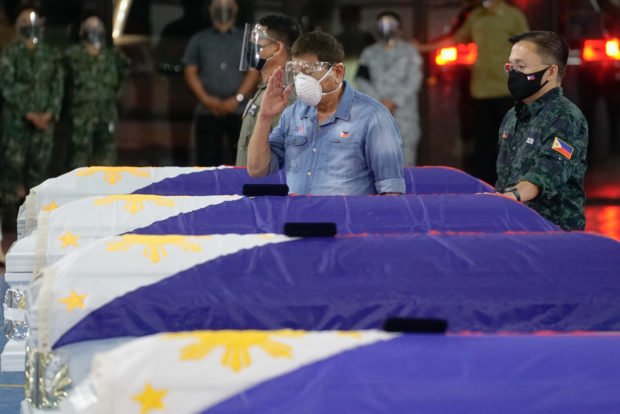
CRASH CASUALTIES President Duterte pays tribute to the soldiers who died in Sunday’s C-130 crash in Sulu, during the wake held at the Western Mindanao Command headquarters in Zamboanga City on Monday night.—MALACAÑANG PHOTO
ZAMBOANGA CITY, Zamboanga del Sur, Philippines — Sgt. Al-Ameen Musappa Sahibuddin was excited to go home to Jolo and see his family again after a three-month training in Malaybalay, Bukidnon.
Even after more than two decades with the Philippine Army, the Tausug soldier in his mid-40s was so excited about his new assignment that he even posed for a group picture near the tail of a C-130 plane before boarding it on Sunday.
His optimism proved premature. As the aircraft landed in Patikul, Sulu, it overshot the runway and crashed into a tree-dotted neighborhood nearby.
Fortunately for Sahibuddin, his survival instinct kicked in: He was able to jump off the plane just in time and only suffered injuries on his head and limbs. When word about the C-130 Hercules crash in Sitio Amman, Barangay Bangkal, reached Sahibuddin’s son, he thought his father had no chance of making it alive.
But later hearing the good news, Al-ameen Mussapa now had reasons to give “endless thanks to Allah.”
Sahibuddin was among the 50 survivors of what has been described as the country’s worst military air disaster in decades.
At least 53 others, including three civilians, died in the crash, with only eight of the troopers positively identified as of Tuesday. The latest fatality, recorded on Monday night, was a soldier who sustained chemical burns on his face.
He may have also inhaled smoke that aggravated his condition.
‘That should be the last’
President Rodrigo Dutere flew to Zamboanga on Monday to attend the wake of 49 soldiers who perished, promising aid to the families of the dead and the wounded.
In an interview the following day, Armed Forces of the Philippines chief of staff Gen. Cirilito Sobejana quoted the President as saying: “We cannot afford to have a similar incident in the future. That should be the last.”
Sobejana said that he had directed Philippine Air Force (PAF) chief Lt. Gen. Allen Paredes to review the airworthiness of all the major service command’s aircraft.
“The President’s instruction is very clear, our air assets and other military equipment should be in good shape all the time,” the AFP chief said. Last Sunday’s crash was the second in two weeks and the fourth in the last seven months involving a PAF asset.
Sobejana said the C-130’s black box or flight data recorder had been recovered.
“We would be able to hear the last conversation of the pilots and crew at the cockpit to find out what really happened,” he said. Identifying the dead is proving to be a challenge, he said, as the bodies “were burned beyond recognition because the [soldiers] were unable to flee when the C-130 exploded.
The remains of six of only seven so far identified were placed in flag-draped caskets which were viewed by the President on Monday night, Sobejana said.
Dreaming of retirement
“We are doing our best effort to identify the cadavers because we need to bring them home to their families at the soonest possible time,” the official said, adding that apart from matching dental records, DNA identification has begun.
It was a different story for the family of Sgt. Butch Maestro, who had been dreaming of early retirement so he could spend more quality time with his three children, according to his cousin, Anna Roel. On Monday, Maestro’s immediate superior called to inform his loved ones that he was among those who died in the crash.
Proud of his roots, the sergeant was said to be wearing three metallic tribal bracelets on the day he died.
Marawi hero
Two days after the tragedy, Tullang Bush Hawrani, 51, was still desperately asking about his son, Private First Class Alzid Hawrani.
“If he’s dead, he should have been buried within 24 hours,” the father said in an interview at his home in Sitio Kapok, Barangay Upper Calarian, Zamboanga City.
Two hours before the crash, Hawrani said, Alzid was still able to call the family and “was excited to be reassigned in Sulu so he can have more time to visit us here.
In Surigao (his previous assignment), they were just given five days break, while in Sulu, they can enjoy at least a week or more.”
As he spoke, Hawrani held a photo of his son while in combat deployment in Marawi to free the city from Islamic State-linked militants in 2017. “My son was a hero and survivor of the Marawi siege.
His only dream then was to have a steady income to help us,” he said.